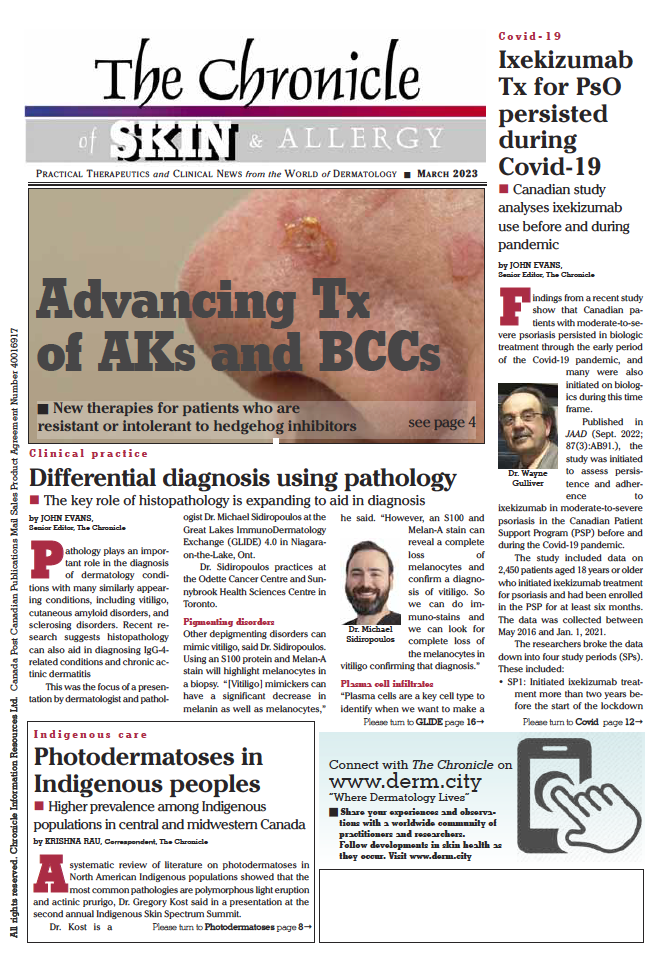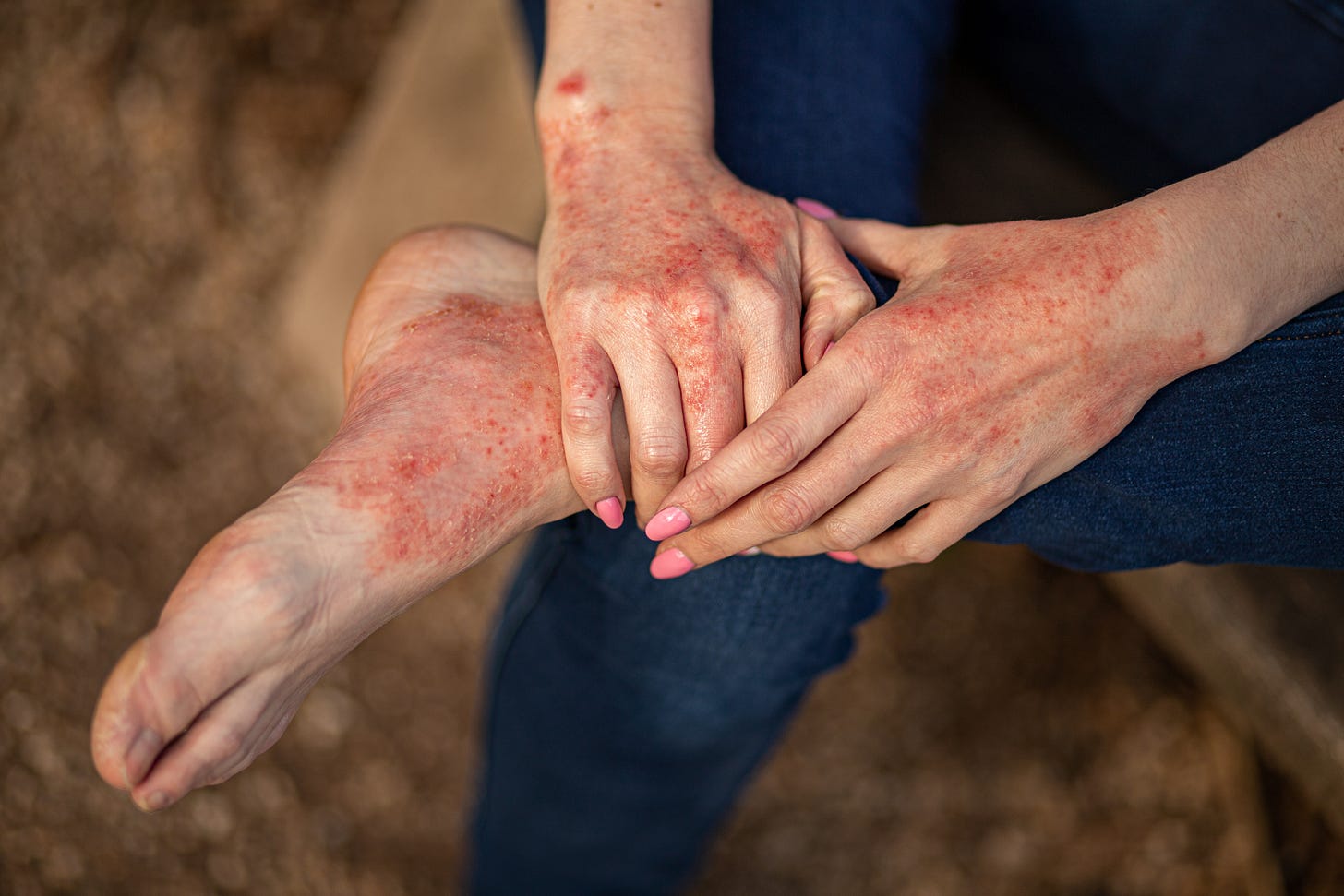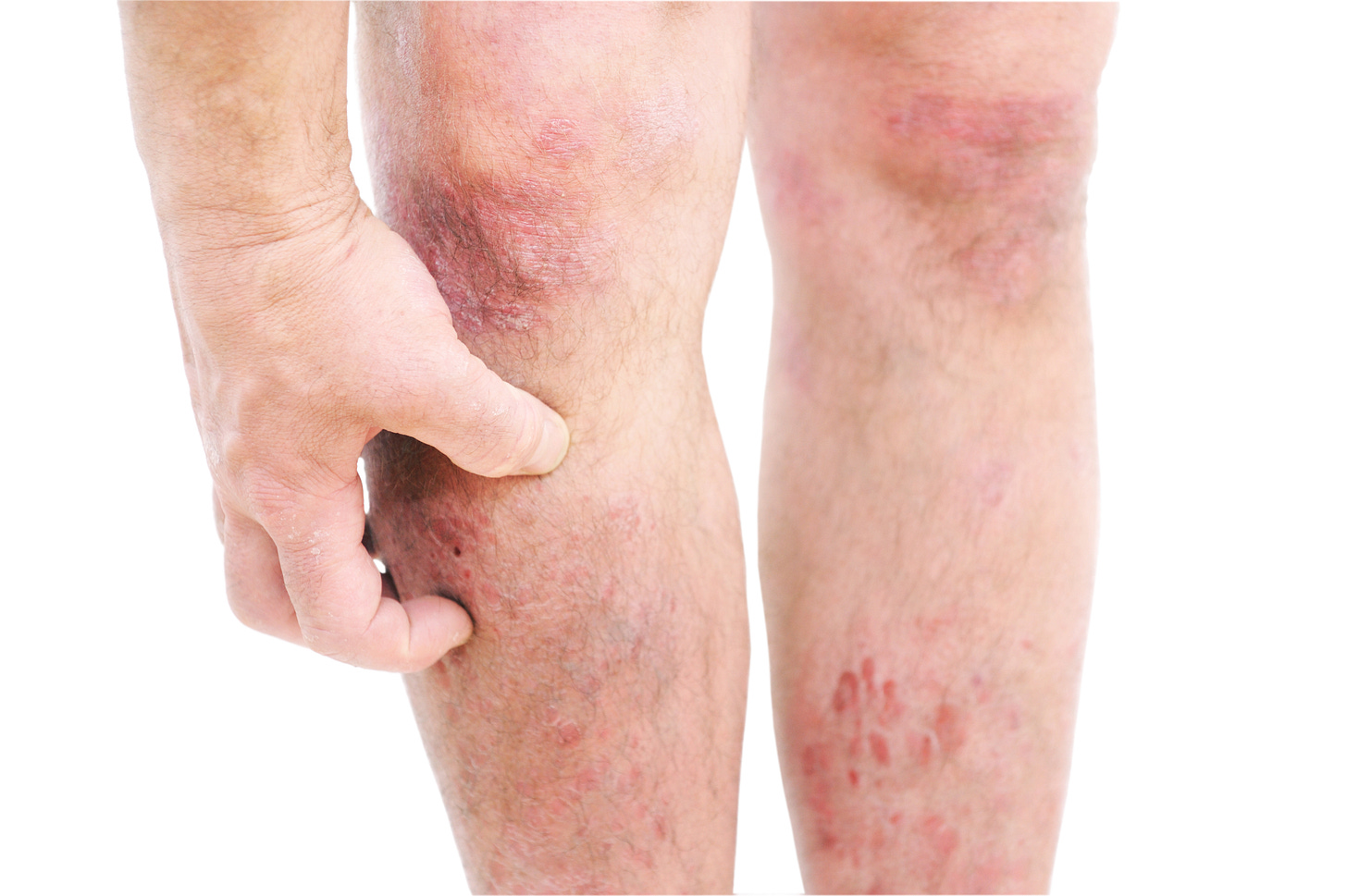Treatment with upadacitinib in active psoriatic arthritis
Today's report also covers risankizumab use in HIV patients, bimekizumab in DMARD-naive patients, izokibep in treating plaque psoriasis, and more (1,900 words, 9 minutes, 10 seconds)
The Vender on Psoriasis e-newsletter is supported by an unrestricted grant from Sun Pharma Canada
Good morning and welcome to the ninth issue of Special Reports: Skin Spectrum Weekly presents “Vender on Psoriasis.” This series is based on Dr. Vender’s popular column appearing in each edition of The Chronicle of Skin & Allergy, which offers expert commentary and opinions on current clinical developments in PsO. We’d love to get your feedback and suggestions and invite you to be in touch. Please write to us at health@chronicle.org

Treatment with upadacitinib in active psoriatic arthritis
In this study published in Rheumatology Therapy, the researchers assessed the effectiveness and safety of upadacitinib in patients with either oligo- or polyarticular active psoriatic arthritis (PsA) using real-world clinical data from an observational, prospective, multicentre study.
Known as the UPJOINT study, researchers conducted an interim analysis that focused on upadacitinib's efficacy and safety, from baseline to 24-weeks. The analysis included various outcome measures, such as composite measures, clinical assessments, and patient-reported outcomes, such as minimal disease activity (MDA), very low disease activity (VLDA), Disease Activity Index for Psoriatic Arthritis (DAPSA), Leeds Enthesitis Index (LEI), resolution of dactylitis, nail psoriasis, and body surface area affected by skin psoriasis (BSA).
The analysis included 296 patients with baseline data and 192 who completed the 24-week visits. Notably, the proportion of patients achieving MDA increased significantly to 39.1% at week 24 from 2.7% at baseline. Similarly, the number of patients in DAPSA remission (DAPSA ≤ 4) increased to 16.7% by week 24 from zero at baseline. By that time, 59.4% of patients either achieved DAPSA remission or had low disease activity (DAPSA≤14). Over the 24-week period, the proportion of patients with BSA≤3 increased to 91.1% from 80.7%.
At weeks 12 and 24, there was a substantial reduction in the percentage of patients with active enthesitis and nail psoriasis, with the figures decreasing to 45.14% and 47.19% for enthesitis and 2.6% and 5.7% for nail psoriasis, respectively.
The data from this real-world study support previous findings from randomized controlled trials, indicating that upadacitinib is an effective treatment for active PsA. Importantly, the study did not identify any new safety signals, suggesting that upadacitinib can be safely used for patients with PsA.
Comment: Published clinical trials report standardized data and conclusions, based on primary endpoints that are established by the sponsor and agreed-upon by steering committees for protocols. This study looks at real world experience and tells us as well as confirms the efficacy of upadacitinib in psoriatic arthritis. Dermatologists rarely perform joint counts and therefore assessing nail psoriasis as well as dactylitis that is clinically obvious is simple for dermatologist with keen observational skills. Enthesitis is not difficult to assess either by questioning the patients about pain at certain tendon insertion points that are common in psoriatic arthritis. This prospective multicentre study confirms what was seen in clinical trials. More importantly, the safety has been reassured for this popular JAK inhibitor giving great success, and relief, to patients that suffer from psoriatic arthritis.
Effectiveness and safety of risankizumab in HIV patients with psoriasis: A case series
Patients living with HIV (PLHIV) often face limited treatment options for moderate-to-severe plaque psoriasis. This study published in the International Journal of STD & AIDS (DOI: 10.1177/09564624231199510) looked at the use of risankizumab, an interleukin-23 inhibitor, in this specific population due to its known safety and efficacy in psoriasis management. The authors report on four cases of PLHIV with moderate-to-severe plaque psoriasis treated with risankizumab and observed for 16 weeks. Notably, all patients achieved significant skin clearance without encountering any adverse events.
Psoriasis is a prevalent inflammatory skin condition affecting around 3% of the global population, with a comparable prevalence in PLHIV. In PLHIV, psoriasis can manifest severely, and its severity often correlates with the chronicity of HIV infection. The challenge lies in treating psoriasis in PLHIV since conventional immune-suppressive drugs are not viable options, and caution is warranted when considering biological therapies.
Interleukin-23 inhibitors have shown remarkable efficacy and safety in clinical trials. However, data on their use in PLHIV remain extremely scarce.
The findings from this limited case series suggest that risankizumab could be a safe and effective therapeutic option for managing psoriasis in PLHIV. Nevertheless, it is essential to emphasize the need for more extensive prospective studies to substantiate these preliminary results and provide a stronger foundation for the use of interleukin inhibitors like risankizumab in this specific patient population.
Comment: Special considerations are difficult when it comes to other diseases that can affect the immune system, such as hepatitis B, hepatitis C, malignancy, pregnancy, and in this case, HIV. This small case series, add to the other case series that have shown efficacy, but more importantly, safety, when using interleukin 23 inhibitors. These biologics are extremely focused and targeted and rarely, if ever, affect other pathways that are involved with these diseases mentioned above. Unfortunately, this is a very small case series and one should not rely on this paper to determine the safety in HIV. It is always best to use multidisciplinary management in patients with HIV after discussing with their infectious disease physician or other specialist. The patient should always be included in this discussion. And, obviously, more evidence is required.

Bimekizumab in biologic DMARD-naïve patients with active PsA: 52-week efficacy and safety
Bimekizumab (BKZ), a monoclonal IgG1 antibody targeting interleukin (IL)-17F and IL-17A, has shown remarkable efficacy in biologic disease-modifying antirheumatic drug (DMARD)-naïve patients with active psoriatic arthritis (PsA) at the 16-week mark. This study in Annals of the Rheumatic Diseases provides insights into the long-term efficacy and safety of BKZ up to Week 52.
The BE OPTIMAL trial consisted of a 16-week double-blind, placebo-controlled phase followed by a 36-week treatment-blind phase. Patients were randomized to receive subcutaneous BKZ 160 mg every four weeks, placebo with a switch to BKZ at Week 16, or adalimumab (ADA) 40 mg every two weeks. Efficacy outcomes were assessed using American College of Rheumatology (ACR) response criteria 20/50/70, Psoriasis Area and Severity Index (PASI) 75/90/100 (for patients with baseline psoriasis affecting ≥3% body surface area), and minimal disease activity (MDA) with non-responder imputation.
The results revealed that BKZ maintained ACR20/50/70, PASI75/90/100, and MDA responses from Week 16 to Week 52, consistent with earlier findings. Patients who switched to BKZ at Week 16 also exhibited improved efficacy, achieving similar results to those initially randomized to BKZ by Week 52.
In terms of safety, the majority of patients experienced at least one treatment-emergent adverse event (TEAE) during BKZ treatment, which was similar to the rate observed with ADA. Serious TEAEs occurred in a small percentage of BKZ-treated patients (6.6%), and there was one reported death (0.1%). Candida infections were more common in the BKZ group (7.7%) compared to ADA (0.7%), but all cases were localized and non-serious.
BKZ demonstrated sustained efficacy in biologic-naïve PsA patients from Week 16 to Week 52, with an acceptable safety profile. No new safety concerns emerged during the study, supporting the continued use of BKZ as a treatment option for PsA.
Comment: At the time of this writing bimekizumab was not approved by the FDA in the United States but it is approved in Europe and in Canada for the treatment of moderate to severe psoriasis. It is also approved for the treatment of psoriatic arthritis in Europe, but not in Canada at this time. This important study shows that this interleukin 17 inhibitor is effective in treating psoriatic arthritis with responses as early as 16 weeks maintaining out to week 52. This comparative study was done versus adalimumab, which is the standard of care for psoriatic arthritis for most rheumatologists. However, the difference in skin efficacy is very different from that of bimekizumab versus adalimumab. Adverse events are uncommon with most biologics however with bimekizumab candidiasis can be seen but cases are almost always localized, non-serious, and easily treated. It is uncommon to stop therapy due to oral candidiasis associated with bimekizumab. Further studies using bimekizumab in biological experienced patients are being done and results should be available shortly.

Izokibep for the treatment of moderate-to-severe plaque psoriasis
This phase II study, known as AFFIRM-35, assessed the dose response, efficacy, and safety of izokibep, an interleukin (IL)-17A inhibitor, in patients with moderate-to-severe plaque psoriasis who had inadequate responses to two or more standard therapies.
Published in the British Journal of Dermatology, 109 adult patients were enrolled in the study and randomized into five groups: placebo, izokibep 2 mg, 20 mg, 80 mg, or 160 mg, administered every two weeks for 12 weeks. After this initial phase, patients initially receiving placebo were switched to izokibep 80 mg, and dosing intervals for all patients were adjusted based on Psoriasis Area and Severity Index (PASI) scores. The core study was followed by two optional one-year extension periods, resulting in a total study duration of three years.
The primary endpoint was the achievement of a 90% reduction in PASI score (PASI 90) at week 12. Results indicated that PASI 90 response rates increased in a dose-dependent manner, with rates of 0%, 5%, 19%, 71%, and 59% for the placebo, 2 mg, 20 mg, 80 mg, and 160 mg izokibep groups, respectively, at week 12. Rapid dose-dependent improvements were also observed across other efficacy outcomes.
During the placebo-controlled period, adverse events (AEs) in the izokibep groups were generally similar to placebo, except for mild injection site reactions. AEs were predominantly mild to moderate, and the drug was well tolerated.
Izokibep maintained its efficacy at higher dosage levels for up to three years, with no emergence of new safety signals. These findings suggest that izokibep is well-tolerated and effective in treating plaque psoriasis. Higher doses or more frequent dosing may further enhance response rates.
Comment: There could never be enough biologics to treat our patients as some come and some disappear depending on economics and adverse events associated with these medications. In this case there is a new interleukin 17 inhibitor called izokibep. This again shows the power of interleukin 17 inhibitors by having an extremely high PASI-90 response with this drug. Because this is an early phase study, the dosing has not been finally determined. Although interleukin 23 inhibitors affect the master cytokine, interleukin 23, the end result is always reducing interleukin 17 which these interleukin 17 inhibitors, such as secukinumab, ixekizumab, bimekizumab, and brodalumab directly attack. Phase III studies will determine how izokibep reacts in the larger population.

If you find the contents of this newsletter interesting, please check out the Vender on Psoriasis podcast. It’s available at Apple iTunes, Stitcher, Spotify, or wherever you get your podcasts.
Dr. Ron Vender is a Hamilton-based certified dermatologist with over 30 years of clinical practice experience and over 100 clinical trials in psoriasis. He is founder and director of Dermatrials Research Incorporated and Venderm Consulting, specializing in treatments and management solutions for individuals with psoriasis.
Subscribe to The Chronicle of Skin & Allergy
Established in 1995, The Chronicle of Skin & Allergy is a scientific newspaper providing news and information on practical therapeutics and clinical progress in dermatologic medicine.
To apply for a complimentary* subscription, please email health@chronicle.org with your contact information or click the link below.






